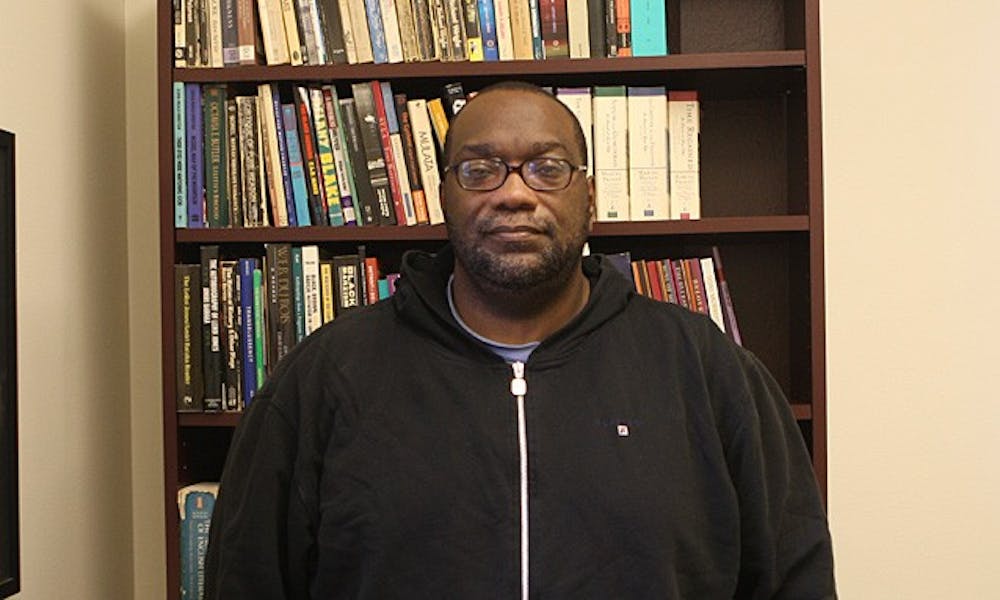Ask Fred Moten where his career as a poet began and he’ll tell you—at a nuclear test site.
It was the early 1980s, and the future Duke English professor was 19. After nose diving out of Harvard as a freshman, he’d come home to Las Vegas for a year and taken a job as a janitor at the infamous Nevada Test Site, where the U.S. government set off hundreds of nuclear explosions over the course of the Cold War. He describes the gig as a daily three hours of work and five hours of hiding to avoid more work, time he used to jot down poems and “read a lot of Dante.”
“[The test site] was kind of a great place because it was this zone of failures,” he said. “We all looked at each other and realized, this is what happens—you mess up and then all of the sudden you’re cleaning toilets in the desert.”
Fast forward 30 years and Moten has racked up degrees from Harvard—where he had returned after that year of scrubbing floors—and University of California, Berkeley, taught at several universities, including the University of Iowa, NYU and Duke, and recently nabbed a spot on the Poetry Society of America’s 2009 list of best new American Poets. His past experience working at a nuclear test site is far from the only unusual thing about his career trajectory.
Take, for example, the fact that Moten is both a scholar and a published creative writer, not a set of job descriptions many people can claim. After all, when you combine the difficulty of getting a Ph.D. and a job at a top university and then toss in the mind-bogglingly slim odds of getting a book of poetry published, the number of people left standing is pretty small.
But that doesn’t faze Moten, a scholar whose work mixes black studies, performance studies, poetry and critical theory, and a poet whose experimental style operates out of many of those same traditions. He is the author of both scholarly work and several books of poetry, including the newly released B Jenkins. If anything, being a scholar simply poses more of a challenge for his creative writing—he’s so well read that he knows immediately when his own work isn’t up to snuff.
“It’s very difficult when your role models are Shakespeare and Milton,” he said. “Everyone has to come terms at some point with the fact that you’re not going to live up to that—and then you just keep going or you don’t.”
He did, and although he may not be Shakespeare, Moten has had his own bit of success in the contemporary poetry world. Last year, the Poetry Society of America chose him as one of 16 poets honored for an outstanding first book of poetry, and published one of his poems, “Rock the Party, Fuck the Smackdown” in the literary journal A Public Space. PSA Programs Director Rob Caspar said Moten caught the group’s eyes—and ears—with poetry that was experimental and “radically lyric.”
“There’s song and voice, at the heart of his work,” Caspar said, “but it’s a new and complex song, and a voice that probes and pushes as much as it celebrates.”
As for how he thinks of his own writing, Moten explained to the literary journal Callaloo that he doesn’t see poems as neatly wrapped ideas or images. Instead, he believes that “poetry is what happens…on the outskirts of sense.”
This unorthodox approach to writing extends beyond Moten’s own projects, spilling over into his teaching philosophy. In a Fred Moten English class, a standard essay on a piece of literature might be replaced by a sound collage or a piece of creative writing reacting to the reading. It’s an attempt, he said, to get his students to write like they actually want to write—not the way they think they need to for a class.
“School makes it so that you write to show evidence of having done some work, so that you can be properly evaluated and tracked,” he said. “To me that degrades writing, so I’m trying to figure out how to detach the importance of writing from these structures of evaluation.”
Second year English Ph.D student Damien Adia-Marassa said this means that Moten’s classes are never the same. Last Spring, Marassa worked as a “teaching apprentice” in one of Moten’s undergraduate courses, “Experimental Black Poetry,” for which he said there was never a fixed syllabus.
“He just told us the texts he wanted to study and invited us all to participate in thinking about how we might study them,” Marassa said.
But is Professor Moten ever worried that students will take advantage of his flexibility with structure and content?
Actually, he said, he doesn’t care if students take his courses because they think they will be easy.
“I think it’s good to find things in your life that are easy for you,” he said. “If someone signs up for my class because they think it will come naturally to them and it won’t be something they have to agonize over, those are all good things in my book.”
In the Spring, Moten will switch gears as a professor, teaching his first creative writing course since arriving at Duke—Introduction to Writing Poetry. But whatever the course title may imply, he won’t be trying to teach his students how to write, he said. Instead, he hops they’ll come away from his class better at noticing the world around them.
And he hopes to teach them to that, in order to write, you first have to fiercely love to read. That’s a skill he learned a long time ago, out in the flat Nevada desert, when he first picked up a book of poems and started to read, not knowing where it would take him.
Get The Chronicle straight to your inbox
Signup for our weekly newsletter. Cancel at any time.

